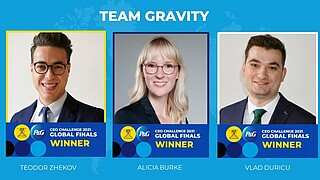In this case competition, the teams had to solve a business case where they had to prove their business acumen and demonstrate their leadership skills. The teams were challenged to scale SweepSouth, a South African cleaning service company with a strong sense of corporate social responsibility. The organisation’s mission is to provide work at decent pay, in a country with a high level of inequality and unemployment. The students received the case material a week before the competition and had to prepare a 10-minute presentation to present their solutions on the day of the competition.
A twist in the case
After all teams presented their solutions the three best teams received a twist in the case, related to Covid-19. They had one hour to revise their initial presentation to address the new challenge. The three teams then presented their new findings, and the overall winner was selected by the second-round judges.
Both RSM teams made it into the final round and eventually ended in the first and second place. The jury was impressed with the RSM teams because of their well thought out solutions and how they delivered them. Both teams held a strong overview of both the big picture, as well as showing understanding of details such as cultural aspects.
Combined specialisms
“Our team effort made us truly excel. All of us had individual strengths, and we noticed that the synergy of our different backgrounds, knowledge and experiences lifted our team results and led to the eventual win,” said one of the participants from the winning team.
The winning team from RSM comprised Keisha Mathews (BSc International Business Administration), Ilse Verstappen (MSc Organisational Change & Consulting), Dzhem Chavush (MSc Marketing Management), and Niek van Disseldorp (MSc Strategic Entrepreneurship). Their prize money was US$2,000.
“The International Executive Challenge was a very intense but extremely rewarding experience,” said another RSM team member. “Not only did we have to put our leadership skills to the test, but we also had to reckon with numerous other factors. By doing so, combined with the great guidance and feedback we received, we were able to develop ourselves on so many levels.”
The runner-up team in the challenge was also from RSM: Stefan Tilro (MSc Finance & Investments), Robin Hijzen (MSc Management of Innovation and MSc Global Business & Sustainability), Sam Nieuwenhuis (MSc Organisational Change & Consulting), and Guillermo Dirksz (BSc Business Administration). They won US$1,000.
Both teams were coached by Silian Shaller from RSM’s Erasmus Centre for Leadership, who helped the teams to prepare for the case competition.
The jury
The jury of the first round consisted of a panel of business executives: Kevin Cope (co-founder and CEO, Acumen Learning), Michael Simpson (managing partner, eBACS), Michelle Bowman (director, US Performance Marketing, FedEx Services), Lynn Vike (vice-president HR, Align Technology), Shawn Moon (CEO, Zerorez Franchising Systems, Inc.), Tracy Geltz (manager product development, John Deere), Miha Stan (assistant professor, University College London), Dave Jenkins (founder and former CEO, Conservice), and Roger McOmber (managing partner, McOmber Capital).
The second-round judges, who chose the winners, were David Covey (co-founder and CEO, SMCOVEY), Lord Dr Michael Hastings (MP, British House of Lords; and former global head of citizenship, KPMG), and Ken Thompson (principal, AlignOrg Solutions).
The challenge
The International Executive Challenge is a fast-paced simulation where 12 global teams face off in an immersive leadership development experience. Student teams place themselves in the shoes of C-level executives, solve complex real-world business problems and test their leadership in front of experienced leaders who act as a board of directors.
This was the third time the competition took place, but the first time that business schools from outside the USA were able to participate. It was organised by The Stephen R. Covey Leadership Center at the Jon M. Huntsman School of Business, Utah State University. Other teams came from top business schools from across the world: University of Manchester (UK) Wharton, University of Pennsylvania (USA), Utah State University (USA), Kühne Logistics University (Germany), Stellenbosch University (South Africa), and the University of Zurich (Switzerland).





